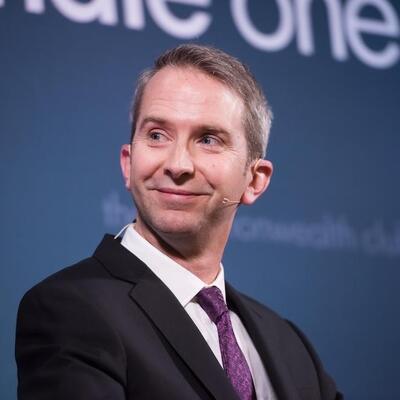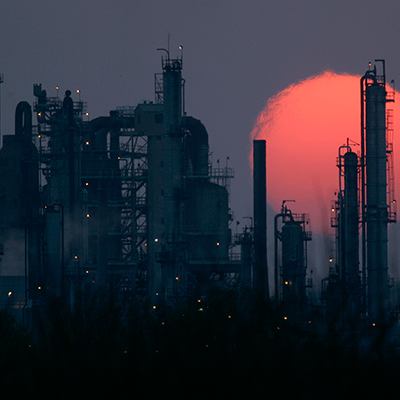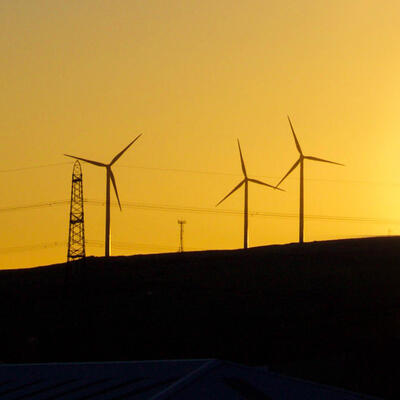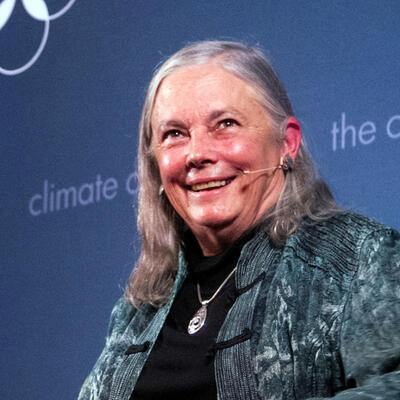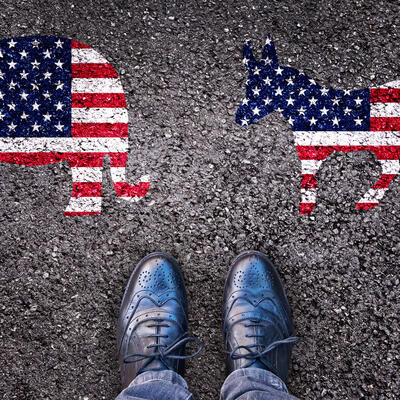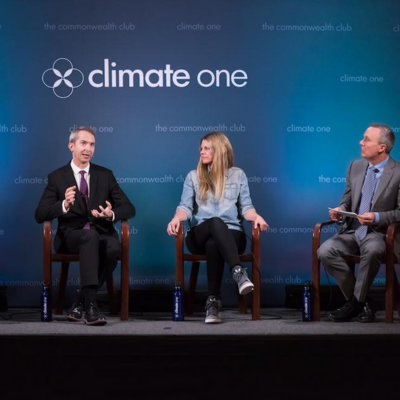
2016: From Paris to Trump
Guests
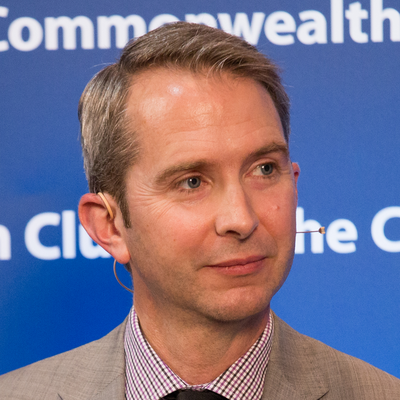
David R. Baker
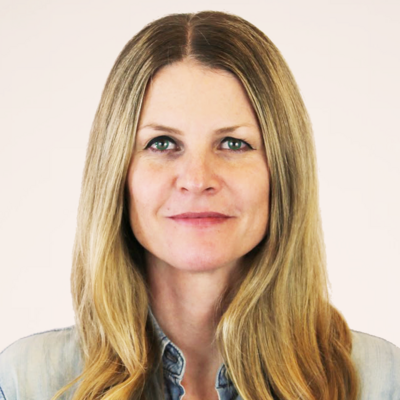
Katie Fehrenbacher
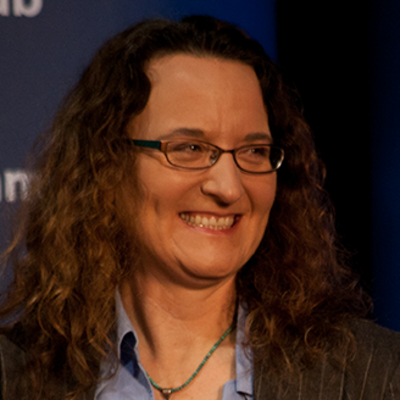
Cassandra Sweet
Summary
2016 began in the after-glow of the Paris climate summit and ended with the election of Donald Trump. A look back at the year’s energy triumphs and setbacks.
David R. Baker, Energy Reporter, San Francisco Chronicle
Katie Fehrenbacher, Former Senior Writer, Fortune
Cassandra Sweet, Reporter, Wall Street Journal
This program was recorded in front of a live audience at the Commonwealth Club of California on December 7, 2016.
Full Transcript
Greg Dalton: From the Commonwealth Club of California, I'm Greg Dalton. And this is Climate One, changing the conversation about America's energy, economy and environment. As 2016 comes to a close, we look back at the year's most important energy and climate headlines. From the triumph of the Paris climate accord to the surprise election of coal loving Donald Trump. It was a roller coaster year and also was hot. And scientists say 2016 will bring the highest average global temperatures ever recorded as long as humans have been walking on the earth. Why does a little bit of warming matter?
It amplifies droughts by accelerating evaporation and hurts skiers by melting their snow and harshing their buzz. And even makes it hard on the grapes grown to make the wines that many Americans love. Before you reach for a stiffer drink, there was plenty of positive news this year. Bloomberg reported that for the first time, more Americans now work in solar energy than extracting climate hurting, oil and gas from the ground. The solar surge means running your home on the sun's power is now cheaper than ever. And Google announced that in 2017 it will run its global operations on 100% renewable power mostly from wind.
On the show today, we will talk about the autonomous cars and what else they might mean for moving away from fossil fuels that are disrupting the earth’s operating system. Here to talk about all that and more, we have three veteran journalists covering the energy and cleantech beats. David Baker is energy reporter with the San Francisco Chronicle. Katie Fehrenbacher is a former senior writer at Fortune, wearing the coolest shoes ever on this stage. And Cassandra Sweet is an energy reporter with the Wall Street Journal. Please welcome them to Climate One.
[Applause]
Cassandra Sweet, the Paris climate accord brought together almost 200 countries getting on the same page. Is it a big deal? Does that matter to businesses that you cover in the Wall Street Journal?
Cassandra Sweet: It is a big deal because there's a lot of global pressure on the United States to do something about its emissions. You know, and we are one of the top energy users in the world and we also emit among the most greenhouse gases. And we’re a rich country so we can afford to use new technology to cut our emissions. So there's a lot of global pressure from China, India, you know, Europe other countries.
And there's an expectation among I think consumer, you know, ordinary Americans that our government should do something about climate change and that other governments should be doing something. And now I think we’re also hearing from investors, that kind of nameless, faceless group of people who invest in all the big companies that are publicly traded, that we hear about. A lot more investors are becoming concerned about climate change and they’re putting pressure on companies that they invested in to do something. To, you know, have a cleaner operations, to cut their emissions, you know, through energy efficiency and other things like that.
Greg Dalton: David Baker, you cover Chevron. Does Paris mean anything for Chevron or other energy companies that you cover or is it some big obstruct UN thing far away that, you know, is not gonna really directly affect their business?
David Baker: Well at this point there’s actually quite a split in the oil world between the U.S. oil companies and the European ones. And the European companies have banded together and European oil companies have banded together and said, jointly, we need a global price on carbon. We don't care if that comes to cap and trade or a tax, but we need a global price so we can make the decisions over the timeframe that we care about, which for oil companies tends to be somewhere in the 30, 40, 50 year ballpark.
They’ve been very forthcoming, very forward about that. Chevron and Exxon, and the American companies don't want to go there. They’re trying to sort of lay low in terms of public statements about it at this point although Exxon has not been able to do that effectively as Chevron. But, you know, I went to Chevron’s annual shareholder meeting in San Ramon this year. And one of their shareholders got up and said, “You know, just keep doing what you're doing. That's all I want you to do.” And the CEO said “Thanks. That’s what we plan on.” And that’s sort of their approach.
Greg Dalton: And the system that's what they're paid to do is make the most money for their shareholders, including a lot of people. If you own an S&P 500 index funds, as a lot of people the oil companies are a big part of that, and so we’re part of that. Katie Fehrenbacher, Silicon Valley likes to think that it's far away from policy, Washington DC. The UN is probably even another further way. Does the Paris climate agreement mean anything in Silicon Valley?
Katie Fehrenbacher: Probably not as much compared, for the startups, compared to some other bigger energy companies. I mean Silicon Valley is in kind of a new era where they have to pay more attention to policy. You know, there's companies like Uber, Airbnb who are coming up against regulators in different markets. And so I think there is kind of this new trend of startups having to pay attention to greater policy and regulatory issues. But I think in terms of Paris, I don't think there was a great deal of attention paid to Paris in the tech startup community so much.
Greg Dalton: Certainly not startups, though Facebook had a big presence there at the Le Bourget; II was there in Paris and Facebook with very visible presence. But certainly the smaller companies maybe not so much.
Katie Fehrenbacher: Yeah. Well some of the big Internet companies have made a big push to kind of embrace that for a variety of reasons.
Greg Dalton: I want to talk about the election, obviously one of the big stories of the year. Earlier, it was actually last year, Donald Trump was asked by Bill O'Reilly of Fox News about his belief in global warming. Let's hear what he said.
[Start Clip]
Donald Trump: I think that there’ll be little change here. It'll go up, it’ll get a little cooler it’ll get a little warmer like it always has for millions of years. It’ll get cooler, it’ll get warmer. It’s called weather. I do believe in clean and obviously a lot of people don't know this. I've received many environmental awards. Many, many environmental awards for the work I do. And I believe strongly in clean water and clean air, but I don't believe that what they say. I think it's a big scam for a lot of people to make a lot of money.
[End Clip]
Greg Dalton: Donald Trump on Fox News. David Baker, what do we know about his policies and how he can, he clearly favors fossil fuels. How is that gonna play out?
David Baker: Yeah, we still don’t know exactly. I mean, he doesn't always do and say the same things on a particular topic, but I mean, you know, just in the last couple of weeks, just in the last couple of days. He had a sit-down meeting with Al Gore to talk about climate change. He told a couple weeks ago, told the New York Times editorial board he was keeping an open mind on Paris. But if you look at his transition team, and if you look at some of the names he's floated or settled on for picks for his cabinet, you have a stunning number of climate skeptics, contrarians, deniers, whatever term you want to use. And today the big news was that he was picking the Atty. General from Oklahoma to be the new head of the EPA. This is the man who has led the states that opposed the clean power plan in suing the EPA. That same person who coordinated the lawsuit against the EPA would be in charge of the EPA. So that doesn't really give me a great feeling about how effective Mr. Gore was in their conversation the other day.
Greg Dalton: Cassandra Sweet, can Donald Trump cancel Paris? Can he, you know, what impact can he have on that process?
Cassandra Sweet: I think from the people I've talked to, the Paris climate agreement is, I think the train has left the station in terms of U.S. utilities cutting their greenhouse gas emissions. And using more renewable energy to, you know, to bring about the emission cuts that are called for under the clean power plan which is the Obama administration's centerpiece climate policy. And that's a 32 percent reduction by 2030.
And the fact is, most utilities they plan very far ahead. They plan 10 or 20 years into the future and they've already made their plans. They've shut down old coal plants, you know, other coal plants that don't make money are gonna get shut down. Electricity demand in the United States is flat or falling in many parts of the country. And, you know, we still have a natural gas boom. Natural gas is very cheap and wind power is very cheap. And so the markets are actually, are expected to help the United States reach its climate pledge under the Paris agreement.
I think the bigger question is what's gonna happen after that. So I think there was an expectation that if Hillary Clinton were elected that she was going to, you know, push, you know, introduce new mandates, you know, past 2030. And, you know, kind of tighten restrictions on pollution. And so I think people are not expecting that to happen.
Greg Dalton: Katie Fehrenbacher, you cover Silicon Valley. Electric cars, are they doing this? The mantra in Silicon Valley is don’t invest in policy dependent, any company that’s dependent on policy because you get burned, because you could never trust what the government is gonna do. Are they gonna keep moving forward or you think they might change based on this political?
Katie Fehrenbacher: In terms of electric car companies and car companies in general?
Greg Dalton: Yeah.
Katie Fehrenbacher: I think electric cars are definitely coming. I mean you can just look at Tesla, is kind of quintessential Silicon Valley electric car company, you know, pretty successful so far. You know, they had their first profitable quarter in three years, this year. I think everybody is looking at that company as kind of a leader. And then all the big car companies are following suit as well. So I think electric cars are definitely happening but not necessarily having to do with the Paris agreement.
Greg Dalton: There seems to be, every time I turn around there’s a new electric car company I haven’t heard of. There’s one called Lucid that David wrote about. There is Faraday. They’re sprouting all over the place. Are they all gonna be successful? It can be some pretty spectacular crash.
Katie Fehrenbacher: They're definitely not all gonna be successful. There is going to be some crashes and we’re probably witnessing may be the start of some of the crashes right now. But I think actually to get back to Tesla, I think Tesla and Elon Musk inspired a bunch of these companies to be able to create an independent car company. So before Tesla it was kind of this, kind of known fact around in the car industry where it was gonna be extremely difficult to be an independent car company. So Tesla and Elon Musk kind of broke that. And so now, there are these new startups. They’re focused on electric cars but also autonomous vehicles. So they’re investing a lot in computing and AI and they’re kind of redoing the form factor of cars.
And a bunch of these new car companies are backed by Chinese investors. So part of that is because the Chinese government put a lot of incentives into developing the Chinese electric car market, but also to give incentive to companies to create new electric car companies in China. So that’s gonna be a big market for electric cars. So a bunch of these new startups are backed by Chinese money, but then also they put some of their headquarters in Silicon Valley so they can access computing talent here, but also for like brand purposes as well.
Greg Dalton: So they’re gonna kind of develop the technology and design the cars here and then make and sell them back home in China, is that the idea?
Katie Fehrenbacher: Mm-hmm.
Greg Dalton: Okay. David Baker, there's been an interesting convergence really between Detroit and Silicon Valley, which used to be very different worlds. But now, auto companies have research and design facilities in Silicon Valley and, you know, according to my 12-year-old daughter, cars as entertainment, mobile entertainment platform, right. There's more code in a new automobile than there is in all of Facebook, which is quite staggering. So what does that mean for the, what are we seeing this year for the future of the auto industry. Does that necessarily mean moving away from fossil fuels or is that just more high-tech gasoline cars?
David Baker: Well, it’s interesting, I mean, you say most of them have opened up shops here; all of them have shops here. You’re absolutely if you’re a major automaker at this point, you have to have a presence in Silicon Valley. And they started that years ago, largely thinking about sort of the infotainment stuff in your car, the one that your kid is talking about, that kind of thing. But between the idea of electric cars and whether or not that's gonna be the future and then the idea of self-driving cars, that convergence is really what cemented the move. And what has forced all of them to come here because the engineers who are good in those two things are here and they are not in Michigan or at least not nearly as many of them.
And it's turned into an interesting situation that I don't think really existed before in the history of the auto industry in this country. In that, especially with the self-driving car thing, you've got all these automakers suddenly within the last couple years coming out and saying, yeah, that's the future. That's what it's gonna look like and we’re gonna charge forward as fast as possible. And if you look over the past of the auto industry, it used to be that pretty much any new technology that involved safety or mileage would be something that they would develop, but they wouldn't really go whole hog in rolling it out until the federal government beat them over the head and said you're gonna do this. This time around, it’s kind of flipped.
They’re still making more money on gas guzzlers than they do on, you know, hybrids or electrics by a long shot but this sort of converged future of self-driving probably electric cars. They're going after it with incredible gusto and the federal government under Obama at least basically just said, go, we’ll be your cheerleader we’re not gonna get in your way. It's for the flip of what used to happen. So yeah, I think that train is leaving the station right now and we’re gonna get to that future whether everybody likes it or not.
Greg Dalton: Katie Fehrenbacher, is Uber part of that? Uber would love to have, you know, not have to pay any humans they just have the cars drive themselves, is that a big part of it?
Katie Fehrenbacher: Yes, definitely. I mean, Uber has been very aggressive on developing self-driving car technology. They started doing this self-driving tests running in Pittsburgh. So they’ve been very aggressive. They bought a startup and so, yeah, I mean Uber would love more than anything to replace all its human drivers with computers for sure. Reduce their costs and liability.
Greg Dalton: Cassandra Sweet, obviously lot of these cars needs juice to power them. There was a time when electric utilities looked at electric cars as like a pain, oh they’re gonna hurt our grid, well, we don’t know what to do with them. Is that still the case?
Cassandra Sweet: Utilities love electric cars. They love electric cars. They’re big cheerleaders for electric cars. And they're seeing them for, you know, more than just, you know, an opportunity to sell more electricity, which they don't mind. As utilities in states such as California, so, you know, here in California we have a 50% renewable energy mandate by 2030. That's a lot of renewable energy to put on the grid. And even now, and I think we’re at 26%, there's a lot of solar power that's generated during the day that we can't use in California because we just don't have a place to put it and we don't need it. So utilities are thinking about electric cars, you know, to kind of give them more an opportunity to develop more infrastructures in the grid and they always make money off of that. But also the batteries in electric cars, if there are a lot of them, the utilities are looking at them as a storage device where they could just push out excess solar power to whatever cars are, you know, plugged in at the time.
And then if that was your car, you’d get free electricity for it. Right now, the utilities are giving away excess solar power to Arizona or in some cases paying someone to take it. Because it's just too much and we’re gonna have more of it. So I think electrification of transportation is definitely gonna happen in California and other states probably Hawaii, you know other states that have a lot of solar and have these very aggressive renewable energy mandates.
Greg Dalton: Cassandra Sweet is an energy reporter at of the Wall Street Journal. If you're just joining us, our other guests at Climate One are David Baker, energy reporter from the San Francisco Chronicle and Katie Fehrenbacher, former senior writer with Fortune magazine. I'm Greg Dalton.
David Baker, another auto story this year was as soon as Donald Trump was elected president, The alliance of auto manufacturers said, oh those CAFE standards that’s been rising recently we want to gonna take, you know, back off on those. And those depending on who you talk to were the number one or number two most important things this country has ever done on climate, reducing fuel demand by couple million barrels. And now as soon as there’s a political change, Detroit’s saying, not so fast. What is the impact of that?
David Baker: That’s a big question mark. But they were gonna be asking for that even if Clinton won the election. They’ve already been escalating the mileage standards over the last few years. And all these by the way in case you didn't know come from California. They were originally codified by State Senator Fran Pavley who is leaving office this month. But the way they set it up, the way the federal government set it up is the standards would ration up slowly for a few years. And then once it got past 2020 they would escalate pretty sharply.
And the car companies looking at 2020, which is not far away were saying, okay we don't have enough electric vehicle sales yet to make this work out. Can we get some kind of wiggle room as to when the highest of these standards hit. The thing though is they can't actually back out of it at this point. In part, because they've already been planning their products around this for years to come, but also because these standards, even if Trump just waved a magic wand and eliminated them at the federal level altogether, they would still apply in California because we have special permission from the government to apply our own standards here in the state if they fight air pollution we’ve had that for years. Plus, Canada adopted the exact same standards. So the automakers –
Cassandra Sweet: Several other states did as well. New York, I think Massachusetts it's at least a dozen.
David Baker: Right. So they don't, the automakers may want some breathing room, but they can't actually even ask for really to abolish these standards because then they'd be in the situation making very different cars for markets that are right next door to each other and they hate that idea. So even if the feds give them that wiggle room, they’ll still probably need to come to California and say, okay will you do the same for us?
Greg Dalton: So that raises the question that a lot of people have been sad about the change in energy policy in this country if California can kinda be the bulwark to defend the progress the country has made. David Baker, you said California can on autos, what about other areas, can California, how much damage can, big of a dent can a Trump administration put in California's clean energy progress?
David Baker: I keep asking people at the state that for the last couple of weeks I asked that of just almost everyone I talked to.
Greg Dalton: Tell us what they said.
David Baker: By and large the thought at the moment is no, California, if California wants to keep pushing ahead which Governor Brown definitely does. California can keep pushing ahead because most everything that we do is based in state law and not in federal law. So even if federal law change or federal regulations change, that doesn't change what we do here in the state if what we're doing is more aggressive than the federal level. You know, our cap and trade system is based on a state law, our renewable power mandates that you are just talking about again, that’s a state law. The fact that we no longer sign power purchase contracts with coal plants: state regulation. So there's not much that the feds could do to change.
Greg Dalton: Cassandra Sweet, can California hold the line?
Cassandra Sweet: I agree Greg, but I mean, I’ll raise you. We’re not alone. New York, New Jersey, Massachusetts, Oregon, Washington, Hawaii, Vermont, who am I missing I mean, I don't know about Illinois. They’re gonna have clean nuclear power law –
Greg Dalton: They have a lot of coal in Illinois.
Cassandra Sweet: But no, we’re not alone. And so I think that there’s gonna be a continued push. I've also talked to some people and I don't think this is on our agenda to talk about today. But I believe that the, actually the Department of Defense is also very committed to pushing for more renewable energy. They do it very quietly, but they are definitely on that path. And I don't see them wavering from that, and I don't see Donald Trump being able to stop that either. So I mean some people I've talked to believe that the military had some influence over Hawaii's 100% renewable energy goal. So I think that those, I see no reason that those states won't continue with what they're doing. And, you know, a lot of companies around the world are still coming here to California to participate in our clean energy markets.
And so I think we’ll be okay. You know, I think maybe if we had more support in Washington for clean energy for California’s clean energy policies, maybe those markets would be bigger and they would grow faster. But I think they'll stay.
Greg Dalton: David Baker, one thing Jerry Brown wants to do is link with nearby states to kind of get them into to sort of already California, Washington and Oregon are fairly green. The Democratic governors are aligned, in the past that's worked up but then there’s been elections where that has faded away. What do you see is, are there regional potential for Jerry Brown or other Democrats to kind of keep up have at least a regional approach along the Blue Coast in this new political context.
David Baker: Well, first of all there is a push underway in Sacramento to create a Western unified electricity grid. And one of the main rationales for that is so that the states could share their renewable power with each other more efficiently than we do right now. That's gonna be pretty hotly debated over the next year or so. But I do think that probably will happen and that will be kind of sort of an entry into this world. But, you know, in terms of getting them other states to like join our cap and trade system. At one point, I think there were seven different states that said they were going to and no, they all dropped out at one point or another. And instead we ended up with Québec and Ontario is probably gonna join us too. So, you know, it's a state-by-state fight and it depends on the political will in each state house.
Greg Dalton: Katie Fehrenbacher, what big stories of 2016 that we not talked about yet?
Katie Fehrenbacher: I mean just the fact that wind and solar were at their cheapest time in U.S. history I mean utility scale, solar and big wind farms. So you know Warren Buffett is investing massive amounts of money in wind. Put big utility scale solar farms in California, I mean I think that’s huge.
Greg Dalton: And the first ever offshore wind project became, soon to become active in Rhode Island. So tell us about that.
Katie Fehrenbacher: That’s called Block Island. It’s right off the coast of Rhode Island. It's the first offshore wind farm in U.S. waters. It's very small in size. I think it's just five or six turbines but it’s important because offshore wind is actually a large and growing industry in Europe and it delivers a lot of electricity to European countries. So and the U.S. has not been able to build these offshore wind farms before.
Greg Dalton: Because the environmentalists get in the way?
Katie Fehrenbacher: Yes, but also because if you remember Cape Wind was this big poster child for offshore wind on the East Coast. And a lot of people who lived in that area didn’t want to see –
Greg Dalton: Whose name happened to be Kennedy or something like that.
Katie Fehrenbacher: Exactly, didn’t wanna see the wind turbines offshore. And that project was probably too big for the first one and it also was too close to shore. So it riled people up. So this is the first one that's gotten built. It’s supposed to, you know, within weeks or days, it’s gonna be connected to the grid providing electricity for that area. So that’s kind of exciting. And then that should be help develop potentially more of an offshore wind market in the U.S. However, Donald Trump is not necessarily a fan of offshore wind. He is against it next to his golf courses. So we don't really know what he’s gonna do with that. But you never really know what he’s gonna do but it could be a big disaster.
Greg Dalton: Cassandra Sweet.
Cassandra Sweet: So yeah, I just wanted to add. First of all, wind power is extremely cheap now in Texas and other windy states. I think it's less than two cents a kilowatt hour which is very, very cheap. It's a lot less than what we pay our utility. And I think the thing that was keeping offshore wind from being developed before now is that it was very expensive. And it was much cheaper to build a big wind farm, you know, some place where there is a lot of lands and there's a lot of land in the United States. So most of the wind farm developers just focused on all the land that we had in the United States and nobody thought about offshore wind. But it's become a lot cheaper and also the New England states really want to use a lot more renewable energy, you know, similar to the kind of political ambition here in California to use more renewable energy but they don't have a lot of land.
And so right now, they're mainly, you know, they’re burning wood in biomass plants and they’re getting hydropower shipped down from Canada. And they'd really rather have something more than that, you know, they’re doing solar but. So I think offshore wind now that it's a lot less expensive for them. It really could be, there could be a boom someday, I don't know when that's gonna be.
Greg Dalton: We’re gonna see it offshore California?
Cassandra Sweet: I don’t know, I think our coastline is, the water is deeper and so that there's like a –
David Baker: Yeah, we have a very small shelf. So we would have to put the turbines right up against the coast.
Cassandra Sweet: And I think Hawaii has a similar thing. Although, you know, there's experimentation with floating offshore wind. But that's really at the science project level right now.
Greg Dalton: We’re talking about the top energy and climate stories of 2016 with Cassandra Sweet, energy reporter with the Wall Street Journal. Katie Fehrenbacher, former senior writer at Fortune Magazine and David Baker from the San Francisco Chronicle. I'm Greg Dalton.
And we’re gonna go to our lightning round where we ask series of true or false questions to each of our guests starting with David Baker, true or false. Closing the Diablo Canyon Nuclear Power Plant will cause California to get even more of its power from wind, solar and other renewable sources?
David Baker: Eventually.
Greg Dalton: Cassandra Sweet, true or false. Humanity is doomed because of climate change?
Cassandra Sweet: No.
Greg Dalton: Katie Fehrenbacher –
Cassandra Sweet: False.
Greg Dalton: False. You are more concerned about runaway climate change, then you were three months ago?
Katie Fehrenbacher: True.
Greg Dalton: David Baker, true or false. Oil companies trying to block California's move to cleaner fuels are emboldened by having a fossil fuel champion in the White House?
David Baker: Still to be seen.
Greg Dalton: David Baker, if there are – true or false. If there is a climate change conference anywhere in the world, Jerry Brown will fly to it, shake hands and get people to sign a pledge committing cities and states to reduce their carbon emissions? (0:38:13)
David Baker: Absolutely true.
Greg Dalton: Cassandra Sweet, true or false. Many Wall Street Journal reporters recognize burning fossil fuels is disrupting the climate but they don't dare say it around the water cooler or write it in print?
Cassandra Sweet: I think that used to be true. But I think it's –
Greg Dalton: That’s the Murdoch boys came in there’s little more freedom there?
Cassandra Sweet: We talk about it around the water cooler. It’s hard to get a lot of stuff in prints so.
Greg Dalton: Okay. Katie Fehrenbacher, true or false. Self-driving cars will put many professional drivers out of work adding more fuel to the working-class anger that propelled Donald Trump to the White House?
Katie Fehrenbacher: True, but maybe in like 25 years.
Greg Dalton: Okay. David Baker, true or false. You bring up climate change and clean energy at holiday gatherings with your extended family?
David Baker: True. And it gets dicey.
Greg Dalton: Follow up. And they enjoy talking about such a cheery topic with you?
David Baker: Some yes, many false. Some true, some many false.
Greg Dalton: Alright. That ends our lightning round. How they do? I think they did pretty well. Let’s give them thanks.
[Applause]
Katie, how do you talk to, have that difficult climate conversation with people who see it differently than you?
Katie Fehrenbacher: To be honest, I live in San Francisco Bay Area. I don’t come across a lot of climate deniers to be honest.
Greg Dalton: Cassandra, do you have that difficult conversation?
Cassandra Sweet: Yeah, I mean I take a professorial tone. And just explain to them that, you know, there are a lot of scientists who’ve been gathering data on this for a very long time. And so it's not me, it's, you know, scientists who have, you know, confirmed that it's happening, climate change.
Greg Dalton: So quoting pinheads works, okay.
One of the big stories of 2016 was the Dakota Access pipeline and we’re gonna, which you’ve all heard about protesting the rerouting of a pipeline across the Missouri River across some indigenous lands. After months of organized protest, the U.S. Army Corps of Engineers recently decided to look at a rerouting of that pipeline. Here's a CNN report on the reaction to that decision.
[Start Clip]
Reporter: Drumbeats, cheers and tears. The sound of victory for the Standing Rock Sioux and thousands of others gathered to stop the Dakota Access pipeline. This mass of humanity living off the grid, joined by thousands of military veterans helped exert so much political and legal pressure, effectively forcing the pipeline to be rerouted.
Male Speaker: People have said that, no this is either we make it or break it. And I guess we made it.
[End Clip]
Greg Dalton: CNN report on the Dakota Access pipeline. That decision of course could be changed in a Trump administration. David Baker, environmentalists cheer when the Keystone XL is killed or delayed. Cheered here when something is rerouted and yet we all live in a fossil fuel world where we rely on that product. Environmentalists don’t like the tankers that bring it in the Bay Area, they don't like the pipelines. They don't like the railcars that might bring it. That oil won’t come to – to get to the Bay Area, but some other oil may come down from Canada. You look at the energy system broadly; does stopping one pipeline really change the system?
David Baker: It's easy to say no, that it doesn’t. And yet the fact that Canada's oil sands in northern Alberta are sort of bottled up and haven’t been able to really expand production much in the last few years indicates that altogether, yeah, that effort can actually at least delay things. Many of these pipelines are tied to the oil sands and they're all about Canada trying to move this resource that it has that is landlocked to the coast somehow to get it to the global markets. Where they can, not have to sell just to the U.S. they can have more buyers, sell it to China and what not, get a better price, expand more of the production.
And the Canadian government, even under Justin Trudeau has hard time giving up this notion that this is gonna be a major economic driver because they don't have many other major economic drivers on the horizon. And yet, you know, if you look at this battle the environmentalists have waged pipeline by pipeline, they really actually have had an effect. It's not just the fact that oil prices are low right now that has kept the oil sands or the tar sands bottled up. It is this pipeline by pipeline fight and stymieing things every step of the way. And you can call it obstructionist, but it actually does appear to be working.
Greg Dalton: Cassandra Sweet, there’s an irony though here that some of that oil coming out of North Dakota is actually light sweet crude that actually burns cleaner. So if you’re gonna burn oil in a Bay Area refinery, don't you want the cleaner stuff rather than the dirty stuff?
Cassandra Sweet: Yeah, it is but there's still that dilemma. I mean people don't want pipelines running through their town, you know, or through their reservation or their, you know, sacred area or under their drinking water. And so I mean we've seen this also with natural gas pipelines that are proposed in New England.
And, you know, in New England a lot of people want to switch from fuel oil to heat their homes to natural gas, but they can't because there's not enough supply. Even though they're really close to, you know, the oil boom in Pennsylvania there are not enough pipelines to get the fuel to them. And it’s, you know, cleaner burning and all this other thing but, you know, pipelines in general, people don't like them even though they're safer than oil trains.
And then also I think what's really been driving a lot of the, you know, environmental movement, opposing these pipelines is the idea that we should keep it in the ground. And, you know, people, a lot of people believe that you have to take a stand, you know, even if, you know, North Dakota, you know, Bakken light crude is better and cleaner than some of the dirtier crudes. We should still keep it in the ground. So I think that's having an impact.
Greg Dalton: David Baker, one of the big stores in California, closing the last nuclear power plant in the state. I think some people were surprised by that. It’s what 9% of the state’s electricity, Diablo Canyon is gonna be shut down over seven years, replaced by renewables. What impact is that gonna have on the state economy and the state’s climate plan?
David Baker: On the state economy, I don't think it’s gonna have a big impact. But on San Luis Obispo County, economy it's definitely going to, Diablo Canyon has 1,500 employees and I don't think that even includes the security force there, which is huge, absolutely huge. But those are good jobs. Those are high-paying jobs. And, you know, San Luis Obispo County, it's got the University there. It's got a decent wine industry and some tourism, but this was a big pillar, the school the main school district down there. Diablo’s tax revenue to them was I think it's 10% of their annual budget.
So PG&E has actually proposed to state utility regulators who have to approve the shutdown plan. PG&E has proposed basically giving local governments and school districts and what not down there $85 million over the course of the shutdown period. Just to sort of wean them off of the tax income that they would've normally had if the plant stayed open.
Statewide, I don't think it's gonna have a big economic impact. It will make it a little more difficult to meet our greenhouse gas reduction goals but not necessarily sabotage them altogether. The people who want to keep the plant open and there are some very vocal proponents of keeping that plant alive, are convinced that because when other nuclear plants have closed in the past basically that switched, just made people rely more on fossil fuels, they’re convinced that’s gonna happen again. PG&E is saying no, because we’re planning for it so far in advance. We won't actually have to do that. We’ll be able to replace it with renewables and energy efficiency. So there's sort of a lack of trust there on the plant’s supporters.
Greg Dalton: Cassandra Sweet, one of the big renewable fights happened in Nevada this week. Bloomberg Businessweek had a cover with Elon Musk and Warren Buffett duking it out there. Of course Elon Musk packed SolarCity which basically got kicked out of Nevada probably because of utility owned by Warren Buffett. So tell us the Nevada story, there are some other surprise things there with casinos actually going to run their slot machines on solar energy so you can go play the slots and feel good about you’re burning so.
Cassandra Sweet: That’s right. So in the election, you know, the same election that in which Donald Trump, you know, was elected the president. Nevada voters approved a ballot initiative that will restructure, deregulate their electricity markets so that everybody will be able to choose their supplier. And it’ll be a deregulated power market like you have in Texas or New York. You know, we don't have that here in California. And it all was pushed forward by three big casinos, Las Vegas Sands, MGM Grand, and Wynn Resorts and a big data storage provider, Switch Limited.
And it all started when Switch which is they run these data centers that use a lot of electricity and they wanted to be able to use a lot of renewables. They wanted to buy renewables; they have a 100% renewable energy goal. And they were not able to do that because there's a monopoly utility there named NV Energy and it’s owned by Warren Buffett's Berkshire Hathaway. And so they asked permission from regulators to be able to leave the utility service so they can go out and buy their own power and they were told no, they can't.
And so the casinos were already along the way of doing the same thing because they want to be cleaner and they've already taken measures to cut their energy usage. And so it's kind of a long story, but it turned into this ballot initiative that would not just allow big companies like those ones to be able to buy their own energy, you know, their own renewable energy but everybody so that includes residents and small businesses. And it passed by a huge margin, and so Nevada is on their way to being a restructured market and, you know, it could bring back the rooftop solar industry, which was shut down by regulators last year. And, yeah, I mean people in Nevada are happy about it.
Greg Dalton: You can go to Sin City and be green, right?
Cassandra Sweet: That’s right.
Greg Dalton: Perfect.
Cassandra Sweet: Solar powered.
Greg Dalton: David Baker, you mentioned Fran Pavley, State Senator, former schoolteacher. She’d been a schoolteacher for 30 years got into politics later in life. A lot of the key environmental laws in this country started in her hand and her authorship. So she's leaving the politics for now this year. Tell us what's her legacy, what she leaving?
David Baker: She has a really big legacy. I mean even with this change of administration in Washington. Those fuel mileage standards that we were talking about before, which were part of the law that she wrote in 2002. Quite honestly, that's one of the single biggest factors in the fact that California has been able to cut its greenhouse gas emissions over the last few years. That's if you look at where the emissions have been dropping, they’ve been dropping in power generation and transportation and the transportation is because of her.
But yeah, I mean she essentially rewrote the mileage standards for cars across all of North America. And this is a woman who did spend more than 25 years teaching middle school in Moorpark, California just outside of Los Angeles. So she had an amazing impact. She wrote our big climate change law in 2006, AB 32. She wrote the sequel that Jerry Brown signed this year, SB 32, which is gonna force us to cut our emissions 40% below 1990 levels by 2030.
And though we are well on track to meeting our 2020 goals, that’s gonna be tough, that’s I don’t know anyone who thinks that’s gonna be a cakewalk, but that’s now the law and it's the law because of her. So yeah, there are a lot of people in this state who wouldn't recognize her name and wouldn't recognize her face. There are a lot of oil lobbyists and car lobbyists in Washington DC who have cursed her name and know exactly who she is. But she's had a huge impact.
Greg Dalton: She's been at Climate One a number of times. And she has said that teaching children in middle school prepared her well for serving in the state legislature.
[Laughter]
You can check out podcast of Fran Pavley and others at Climate One and in iTunes. Let’s go to our audience questions. Welcome to Climate One.
Male Participant: Hi, I was curious if you could talk about the difference. You spoke about Trump and Paris and whether he’ll hold to it or not. I remember George W. Bush pulling out of the Kyoto Protocol. What is the same or different with this less predictable situation?
Greg Dalton: David Baker.
David Baker: One major thing that's different is that we, under Obama, Paris essentially happened because Obama and the Chinese government decided to make it happen. And it was that connection there between Obama and President Xi that basically forced everybody else to fall into line. And Obama actually under his administration, the U.S. really did become sort of a global leader in trying to tackle this issue and trying to set up a framework whereby we're going to tackle it. Back with Kyoto, I mean we were very actively engaged in that but we were not really the global leader in trying to take action. There is a lot of hesitation on our part. So it's sort of a whiplash kind of thing here. We've very suddenly gone from being a global leader trying to get this done, get this addressed, to probably just going on in the complete opposite direction. So that I think is very different.
Greg Dalton: We’re also 16 years further down the road with more disruption and hotter, more climate killing gases in the air. So the stakes are higher. It's later in the game. Let’s go to our next question.
Male Participant: Could you please talk a little bit more about energy storage. I was intrigued by what Ms. Sweet had to say about utilities like electric cars it’s because of their batteries. I read recently about somebody who’s like come up with a train that's moved uphill during the day and comes down at night and pumps storage. And I understand energy storage is a major constraint on renewables. Thank you.
Greg Dalton: Katie Fehrenbacher.
Katie Fehrenbacher: Oh, yes, utilities and power companies are very interested in energy storage for a variety of reasons. One is the better way to manage the grid and add a kind of frequency regulations what they call it. Another way is pair it with solar, so when solar shines during the day, store it and you can use the energy at night. One major thing that is pushing energy storage forward currently is the cost of lithium-ion batteries has dropped dramatically. So big companies like Panasonic, Sony, Samsung, they’ve been creating these batteries at scale for power tools for cell phones or laptops.
So now they're becoming cheap enough that they can go on to the grid or even be put in the basement of a building or even at a home. And that's one thing Tesla has been trying to do. It’s building this huge factory outside of Reno, Nevada to drop the price of lithium-ion batteries by 30%. So they want to get batteries even lower and they’re building some big battery stations. There's one on the island of Kauai and they're doing one in Southern California with Southern California Edison. So eventually batteries will be even cheaper and be use more widely. Right now they're still a little expensive.
Greg Dalton: David Baker.
David Baker: Would like to have one thing to that. I guess this was back in July, I was interviewing some of the people who run California's electricity grid, the California Independent System Operator out in Folsom. And they fully expect there are so many companies that are working on grid scale electricity storage right now, especially around the Bay Area. The grid operators fully expect that one of those technologies at least is going to pan out. They don't know when so they can't really plan around it. But one of the guys I was sitting down with said when that moment happens that will be the single biggest change in the history of the electricity system. And they are convinced it will happen they just don’t know when.
Greg Dalton: David Baker is an energy reporter of the San Francisco Chronicle. Other guests today at Climate One are Katie Fehrenbacher, formerly with Fortune Magazine and Cassandra Sweet with the Wall Street Journal. I’m Greg Dalton. Next audience question. Welcome.
Male Participant: I worked for EPA for over 30 years and now we got a new boss. And we've had both sides of the fence over the years. But energy has changed quite a bit. So now with natural gas really is, what it’s gonna be and the coal industry not so feasible economically. What do you guys think is gonna happen with all these promises to the coal industry regardless of our pick? Where is this gonna go because natural gas really is readily available.
Greg Dalton: Who’d like to – Cassandra Sweet, could you bring about Duke Energy. It used to be a big coal company, now more on gas.
Cassandra Sweet: That’s right. Duke Energy is switching to gas. They've invested in, you know, gas companies. They’re building gas pipelines. They still have coal but they are not planning to build any new coal plants.
And, you know, one interesting thing too is that some of the parts of the country that are, you know, considered coal country, Pennsylvania and Ohio. That's where a lot of the gases now. So there's been kind of the civil sort of a civil war going on between the two industries. But, you know, I mean gas is gonna win out because it's cheaper, it's cleaner. It's cheaper to build, the gas plants. It requires fewer people to run it. And so there are all these things around gas that are just overtaking coal. The oil companies like gas, you know, they just have a better environmental profile. There are still issues with the methane that’s released, you know, upstream in the gas production fields. And this is something that the Obama administration has been working on.
This is actually a very important issue that I think we just don't know what's gonna happen under Trump. You know, methane as you might know is a lot stronger greenhouse gas than CO2, than carbon dioxide. And so it is quite a big concern. But to answer your question about the coal, I mean, coal is just gonna continue to decline. It’s gonna continue to decline and especially in Appalachia and probably Illinois as well. I think the Powder River Basin will continue to supply, you know, many of the coal plants that are continuing to operate. But I don't think there's much that Donald Trump can do to bring that industry back.
Greg Dalton: There’s a Climate One podcast earlier this year called “Coal Wars” and we had hedge fund people here saying that, you know, investors don't want to go near coal. Wall Street doesn't want to go near coal, lots of financial pressures in that direction. Let's go to our next question. Welcome.
Male Participant: I’d like to slightly change the subject and raise the issue of insurance. I do not understand why we are not seeing the major insurance companies or country in the world more involved in the climate greenhouse climate because of their liability around the peripheries of our continents for flooding and for the storm, the increasingly stormy weather. It is very expensive for insurance companies. So why aren't they out in front?
Greg Dalton: They actually have been quite active, particularly the reinsurance companies. Who would like to take that one?
Cassandra Sweet: I could take it.
Greg Dalton: Cassandra Sweet.
Cassandra Sweet: Yeah, so, yeah, insurance companies, you know, there just hasn't been a lot of coverage of it. But they are looking at this closely. They've got actuaries who look at weather models. And a lot of the insurance companies, well, some of the insurance companies have been big investors in renewable energy and solar. And they've been big, you know, tax equity partners. I think Hancock Insurance, not all of them. But I think if you went to an insurance conference you probably hear the subject of climate change come up. And they are pretty savvy about it. You know, to your question about why they're not more vocal about it.
That's a good question. Because they’re certainly very sophisticated about, you know, what they're expecting in the long term in terms of weather, in terms of sea level rise. In terms of, you know, more extreme storms and droughts and things like that. So I think they're just, they’re probably just quietly, you know, changing their insurance policies and raising their prices.
Greg Dalton: They are raising their prices. There’s something called “Risky Business,” which involved Mayor Michael Bloomberg, Hank Paulson, former treasury secretary under President Bush and Tom Steyer. “Risky Business” looked at risk to property and assets along the coast. So it has been done. And a recent New York Times story showed that property values around in Florida and coastal area is at risk have rebounded less since the great recession than other parts of the country. So property markets are starting to reflect the risk of sea level rise. Let’s go to our next question.
Male Participant: Hi, my name is Andreas]. And my question is it seems that during this election, you know, one of the big drivers particularly from the Rust Belt was around jobs. And as we've been talking about here clean energy is driving job growth at a highest, one of the highest rates across sectors. You know, Tesla was building, manufacturing gigafactories in Reno and Buffalo. So I guess one question is why didn't we hear more about the clean energy job story in the media during this election cycle. And do you think that the clean energy job growth story can help to change the conversation around climate change?
Katie Fehrenbacher: I think we didn't hear a lot about it. I mean in certain circles we did but then in kind of the polar opposites we didn’t hear that story at all. I mean, I think it's the fact that Donald Trump talks a lot about infrastructure and investing in infrastructure and the fact that you know, he's not including energy infrastructure in that is a real shame.
I mean, I think that also the solar and the wind industry, they do have, you know, lobbying arms, but they aren’t as big and well-funded as the fossil fuel industries. So I think those need to grow and tell those important stories more.
David Baker: Well, also I would say, you know, it comes down to the candidates too. I mean Hillary Clinton had webpage after webpage of her plans for renewable power and the jobs that go along with it. She had all these plans for how to convert coal country away from coal into a different economy. But actually out there on the stump, she didn't talk about it all that much. Not nearly as much as you might think for the amount of effort she put in to try to think through policies on it. So, you know, I reported on what her policies were gonna be, but in a way she didn't really help herself there. Anyway, she didn't really hammer home on it. She didn't talk about it much at all.
Greg Dalton: Conventional wisdom is because voters don't vote on those issues. They vote on things closer to home, pocketbook issues, healthcare, those sorts of things less so environment and things deemed to be further away. Let’s go to our next question. Welcome to Climate One.
Male Participant: You touched briefly on the attempt to create a regional power grid. I believe you’re talking about the West Coast possibly with other states bordering California in order to share especially the renewable energy, so there's nexus being generated. Around the world there is substantial development and deployment of smart grid technology. I was wondering if you could talk about the prognosis for that here in the United States.
Greg Dalton: Cassandra Sweet, you covered utility, smart grid.
Cassandra Sweet: Yeah, I’ll take that. Yeah, I mean I think smart grid is definitely gonna take off. And again, you know, California Utilities are leading the way on that because micro grids are, you know like the way that the California Utilities look at this question of how to bring on a lot more renewable energy is to create more kind of network smaller grids that talk to each other and share energy but not like this, you know, this hundred-year-old system that we have. Kind of started with these big power plants with a pipe, you know, that just brought the electricity one way to cities and towns. And this new system is going to be, you know, kind of different sizes of grids all connected together but it'll look more like the Internet. Where you have, you know, computers and other devices that are connected together.
And that's the smart grid. I think that's new technology. The energy industry the power industry has been kind of slower than other industries in really like inventing and using new technologies. You know, like the way we’re used to seeing with smart phones and social media and things like that. But that is changing. The renewable energy mandates are driving a lot of it. But the utilities are also discovering, you know, new benefits to these new technologies that create a smarter grid. That can solve other problems and can save money that they might otherwise have spent on conventional, you know, power equipment and things like that.
So I think it's definitely coming. I don't know how long it's gonna take but utilities in California and New York are leading the way on that.
Greg Dalton: Let’s go to our last audience question. Welcome.
Female Participant: I wonder if you could comment on the sort of human cost of climate disaster. I’m thinking of large migrations, people who have been affected in coastal communities in Alaska and the Pacific and probably many larger numbers of people whose agricultural lifestyle has become untenable. And how does the human cost become reflected in policy or industrial thinking or, you know, any place that raises that as level of importance in our dialogue?
Greg Dalton: There’s this term called the social cost of carbon. Who’d like to tackle that one? Cassandra Sweet.
Cassandra Sweet: I can actually take it. I talked to a really, a fascinating climate scientist. His name is Ram Ramanathan and he's at the Scripps Institute in San Diego. And he's been a climate scientist for a long time. He is working with the Pope, Pope Francis and the Vatican Academy of Sciences, along with a lot of other scientists from around the world. And it appears that Pope Francis is very concerned about climate change because of the impact on poor people. Because they feel the brunt of the extreme weather that results from climate change. And my understanding is that the Vatican is planning a symposium of all religions and I’m not sure, I think it’s coming up, religions from all over the world.
So Imams from Iran, you know, Hindus, Christians of all kinds, you know, Jewish, you know, sects of all kinds. So it's just gonna be like this major world conference. And Dr. Ramanathan and I think other scientists are, they’ve become frustrated with political leaders and they’re now turning to religious leaders to, you know, try to bring together a grassroots movement. So there are people, I guess and answer to your question, there are people who are doing things to fight climate change on behalf of the poor.
We have to wrap it up there. We’ve been talking with David Baker, energy reporter at the San Francisco Chronicle. Katie Fehrenbacher, former senior writer with Fortune Magazine and Cassandra Sweet, energy reporter with the Wall Street Journal. I'm Greg Dalton, host of Climate One. I’d like to thank our audience in the room here in San Francisco and online and on air. Thank you all for being part of tonight.
[Applause]
[End]
